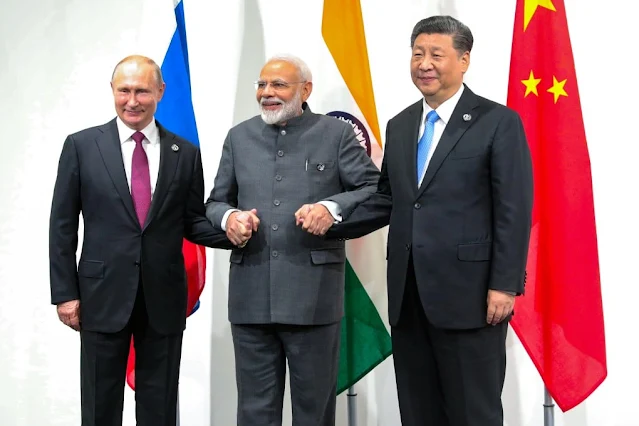As global conflicts intensify and unilateralism grows more assertive, countries across Asia, Africa, Latin America, and the Middle East continue to bear the brunt—economically, socially, and ecologically. In this context, renewed trilateral cooperation between Russia, India, and China (RIC) takes on particular significance. To move beyond a reactive or tactical alliance, RIC must develop a coherent ideological framework that guides its long-term purpose, both within the region and on the global stage.
The RIC idea was first proposed in 1998 by Russian Prime Minister Yevgeny Primakov as a counterweight to Western dominance. It was formally institutionalised in 2002, but despite two decades of diplomatic engagement, particularly through informal and track-two channels, the alliance has yet to articulate a unified vision or ideological orientation.
In 2016, at its 14th Foreign Ministers' Meeting in Moscow, RIC jointly endorsed the idea of an "open, inclusive, indivisible and transparent" regional security architecture. While this marked a step forward, the declaration remained largely aspirational. Deep-seated issues such as territorial disputes, economic competition, and divergent foreign policy alignments continue to impede progress toward substantive cooperation.
If RIC is to function as a genuine strategic bloc, its members must first resolve internal conflicts and commit to non-aggression. A declaration that no RIC nation will act against the core interests of the others could form the basis of mutual trust. Open diplomatic channels and transparent dialogue are essential to creating a stable environment for broader cooperation.
Beyond conflict resolution, RIC should position itself as a platform for decolonisation and anti-imperialism. Such a stance would connect it with the global South and enable deeper partnerships with countries in Asia, Africa, Latin America, and the Middle East. By taking active roles in multilateral forums such as BRICS and the Shanghai Cooperation Organisation, RIC could contribute to the democratisation of global governance and push back against unipolar frameworks.
Drawing on the principles of the Non-Aligned Movement, RIC should champion a more equitable international order—one that is democratic, inclusive, and ecologically sustainable. This includes advancing the rights of working people, protecting the planet, and reimagining development models beyond narrow economic growth.
The alliance could benefit from creating common economic frameworks—trade systems, financial networks, and monetary institutions—that reduce dependency on Western-dominated mechanisms and protect against sanctions and embargoes. These structures would strengthen economic sovereignty while promoting fairer global trade.
On the security front, strategic coordination is essential—not for militarisation, but to uphold peace and counter the influence of military-industrial agendas that dominate Western foreign policy. A shared security doctrine, rooted in non-aggression and non-intervention, could offer an alternative model for international relations.
In the realm of ideas, RIC should foster knowledge systems that respect local traditions, democratic values, and cultural diversity. Promoting secularism, inclusive citizenship, and equitable development would support a form of democracy that goes beyond formal representation and delivers tangible social and economic justice.
To be effective, RIC must rest on five core principles: peace, shared prosperity, human rights, inclusive citizenship, and distributive democracy. These values can help anchor its actions in a vision that prioritises people and the planet over power and profit. The alliance, if it builds on these ideals, has the potential to offer a meaningful alternative in a divided and increasingly unstable world.


Comments